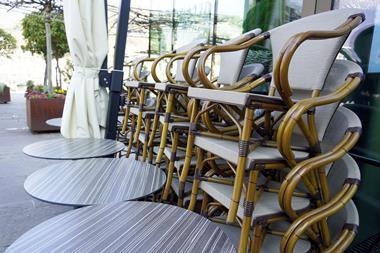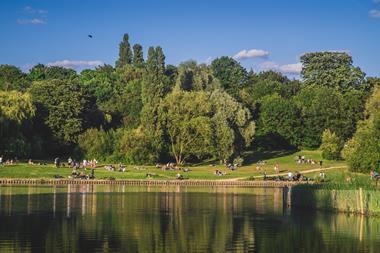When litigation threatens your reputation, using Alternative Dispute Resolution can remove a dispute from the public gaze and keep it out of the court room. Tim Wallis discusses the benefits
"Good name in man and woman, dear my lord, Is the immediate jewel of their souls:
Who steals my purse steals trash; 'tis something, nothing; 'Twas mine, 'tis his, and has been slave to thousands;
But he that filches from me my good name Robs me of that which not enriches him,
And makes me poor indeed."
Iago's words in Shakespeare's Othello may be hollow, but they speak eloquently of the priceless quality of reputation. And risk to reputation can arise in many ways, including the adverse publicity that can surround a well-aired legal dispute.
Disputes are part and parcel of commercial life, but sometimes when a dispute escalates, and disagreement looks like turning into litigation, a company's reputation can quite suddenly be put at stake. Routine concern becomes deep anxiety when the morning's mundane issue becomes the afternoon's front line. As lawyers become engaged, the situation can escalate yet further. Once the parties' horns are locked in litigation, a public hearing can offer the media a field day.
What is the risk management approach to this scenario? The first answer, perhaps, is that good management does everything possible to avoid disputes arising in the first place. For example, you can examine past disputes for steps you might take to prevent a repetition. But what about managing those disputes that you have just not been able to prevent? ADR has the potential to bring a dispute to a conclusion quickly, out of court and away from the media.
Alternative Dispute Resolution (ADR) is a generic term which can be defined as any technique or process which provides a complete or partial alternative to litigation. There are a number of such techniques aimed at settlement. They are usually voluntary. The parties are not compelled to take part. They are also non binding in the sense that no legally binding settlement is reached until such time as the parties involved decide to make a formal settlement agreement.
Mediation is regarded as far and away the most popular form of ADR in the UK. This is a process where:
Mediation is a way to overcome the difficulties of normal face-to-face negotiations, such as neither side wanting to make the first move, neither side wanting to make a concession or a compromise in case the other side exploits it, and neither side wanting to put its cards on the table.
Mediation helps to bridge the communications gap and find common ground. The mediator, who is a neutral and impartial individual, trained to help settle disputes, acts as a diplomat and problem-solver. And, once mediation begins, there is, according to most mediation organisations, a better than 85% chance of reaching a successful settlement.
ADR can be used very successfully where media pressure is high and a company's reputation is at stake. In these circumstances, one of the great benefits of mediation is that it is carried out through private and confidential negotiations. Since the talks are 'without prejudice', nothing that is said can prejudice any later court hearing. In discussions of this nature there is ample scope for one party to apologise to another, where that is appropriate, without impacting on legal liability in any way.
It can sometimes be difficult to persuade a reluctant opponent to agree to mediate, and this can be the toughest part of the negotiations. This difficulty need not arise, however, if there is a contractual relationship between the parties and an ADR clause has been inserted in the contract.
Consider the following questions.
If you can can answer yes to all three, congratulations! If not, consider contacting one of the ADR organisations - CEDR Solve or ADR Group - to find out more.
TAKING THE HEAT OFF
XXX plc was a well known company in a regional city. An unfortunate (but not unforeseeable) event occurred and XXX found itself in dispute with a group of people, all of whom potentially had legal claims for damages against it.
The claimants appointed solicitors. They publicly demanded justice. The regional press became very interested. Solicitors acting for the company and its insurers advised that legal liability was not clear-cut and decisions about the payment of damages could not be made until considerable further investigations had been carried out.
The national press then became interested and the PR heat was turned up further, with public meetings of the claimants. In the regional press the issue was making headlines. It was claimed that XXX was prevaricating and seeking to avoid, if not evade, its responsibilities.
Then XXX publicly offered to mediate all of the claims. It was made clear that no admission was made on liability and the offer did not constitute a promise to make a payment on any particular case. The claimants were warned that matters would still take some time to resolve. Instantly the matter became less newsworthy. The controversy faded and the journalists went elsewhere.
In offering to mediate, the company (and its insurers) had merely agreed to hold private, without prejudice negotiations in good faith, with a view to settlement where legal liability could be established. But it was seen to be doing the decent thing; the move was reassuring to the claimants and an almost total PR solution so far as the company's reputation was concerned.
(This is based on a case handled by Crutes Law Firm.)
HOW MEDIATION WORKS
Once both sides have agreed to mediation and chosen a mediator, a time and place for meeting is agreed. This may be in the mediator's office or in another neutral location. Mediation is not a formal process, so the mediator will invite the parties to join him or her around the table.
The mediator will begin by explaining the process, and will then ask each party to put their point of view. In most cases, the mediator will then talk with each party in confidence in a private room. Such private meetings enable the mediator to understand what the parties want to achieve, and what they feel they can afford to tell the other side.
Over the next few hours, the mediator will shuttle between the parties, clarifying the issues and looking for a mutually acceptable settlement. Gradually, each side begins to appreciate more clearly the options for settlement, and the costs and risks of not settling.
Either party can walk out of the mediation at any time if they feel they are not getting what they want. Everything which happens in the mediation is 'without prejudice', so the parties can carry on preparing to go to court as if the mediation had never happened. However, many mediation providers claim a settlement rate of over 90% .
When agreement has been reached, the mediator will bring the parties together and may ask the solicitors to draw up a formal agreement. This agreement is like any other reached through negotiation: it forms a binding contract between the parties. It is decided by the clients and their solicitors. If legal proceedings have already commenced, the parties will usually agree a formal order to conclude the proceedings.
FIND OUT MORE
For further information about ADR contact:
CEDR Solve www.cedrsolve.com Tel: 020 7536 6000
Exchange Tower
1 Harbour Exchange Square
London E14 9G
or:
ADR Group
www.adrgroup.co.uk Tel: 0117 946 7180
Grove House
Grove Road
Redland
Bristol BS6 6UN
You can view model ADR clauses for insertion into contracts at: www.adrgroup.co.uk
www.cedr.co.uk/library/documents/contract_clauses.pdf
Tim Wallis is a solicitor, mediator and senior partner of Crutes Law Firm, Tel: 0191 212 5653, e-mail: tim.wallis@crutes.co.uk
Part of this article is based on the writer's contribution to the ADR section in Sweet and Maxwell's publication 'The Litigation Practice'.



















